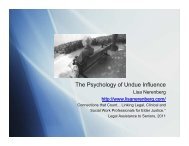Undue Influence: Definitions and Applications - California Courts ...
Undue Influence: Definitions and Applications - California Courts ...
Undue Influence: Definitions and Applications - California Courts ...
Create successful ePaper yourself
Turn your PDF publications into a flip-book with our unique Google optimized e-Paper software.
the signing of contracts, the contracts are voidable by the innocent party, <strong>and</strong> the remedy is<br />
rescission.<br />
In contract law, if a contract is obtained by undue influence, the document is invalid <strong>and</strong><br />
no contract has been formed (Nievod, 1992). In determining whether contracts are the products<br />
of undue influence, courts consider:<br />
• Imbalances in power between signers <strong>and</strong> beneficiaries;<br />
• The circumstances in which the contracts were negotiated;<br />
• Specific actions taken; <strong>and</strong><br />
• The inherent fairness or “naturalness” of transactions.<br />
Imbalances in power result from the nature of the relationship (is it a relationship of trust<br />
or confidence). Weaker parties may also be at a disadvantage as result of diminished capacity.<br />
Therefore, courts consider whether weaker persons were of full capacity at the time they signed<br />
documents, if they understood the facts <strong>and</strong> their rights, if they had time to reflect, <strong>and</strong> if they<br />
had independent advice (Nievod, 1992). In evaluating the results or products of the exchanges or<br />
transactions in question, courts attempt to determine if the transactions give an obvious<br />
advantage to the stronger parties. They may consider, for example, whether properties are sold at<br />
fair value, if employees are compensated at reasonable rates, <strong>and</strong> whether gifts are<br />
commensurate with the length <strong>and</strong> quality of relationships. They may also look at whether<br />
exchanges are “natural,” or what one would ordinarily expect. For example, courts may<br />
scrutinize wills that leave inheritances to new friends as opposed to family members.<br />
Approximately 3% of wills are challenged <strong>and</strong> 1% are found to be invalid (Mohr, 1997).<br />
A survey of will contestations showed that wills are likely to be contested when decedents have<br />
no biological children (this is true in 52% of will contests) <strong>and</strong> when the will was written less<br />
than one year prior to the testators death (this accounts for 48% of contests) (Hall, Hall, Myers,<br />
& Chapman, 2009). There are two primary reasons that wills are contested. The first is dramatic<br />
or “radical” changes from previous wills or inconsistently expressed wishes of the testators. This<br />
factor accounts for 72% of contested wills.<br />
100




